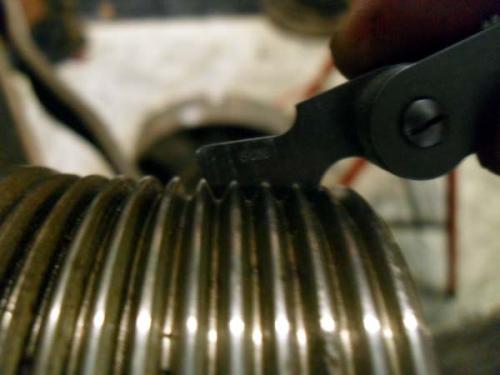Posts: 2,344
Threads: 53
Joined: Feb 2012
Location: Spencer MA USA
That's the right way to do it. First make the O.D. match (unless using cresting, full form inserts), then be certain the pitch of the threads are going to match. Then cut until the pitch diameters match. Done!
If you are using pitch-specific full form inserts, leave the O.D. of the piece .005" to .010" (.12mm to .25mm) oversize. As you machine the thread, watch to see when the cresting insert starts taking some material off the O.D., then you will likely have a match of the two pieces when the O.D.'s match.
Sorry if I made that look easy. I may have a couple of years experience doing it. Until you're well-practiced at it, you can use aids to keep the wires on the threads while you fiddle with the micrometer. Big wires like those used for a 6TPI thread can be stuck on with chewing gum, modeling clay, or with rubber bands to name a few options.
Cheers,
Ken
Posts: 4,683
Threads: 93
Joined: Feb 2012
Location: Perth, Australia
Thanks Ken,
Yes you did make it look easy but in following your instructions, holding the wires hasn't been much of an issue. You method of correctly placing the bottom wire was a big help. I'm glad you showed me as I would be spending more time searching from them on the floor otherwise!
I think I originally confused myself when I measured the spindle thread, as I checked my measurements against a reference for the 6tpi thread and they didn't match. That put doubt into my mind as to whether I was measuring correctly etc but then I figured that these threads were cut over 100 years ago, so they are probably not going to line up exactly with the standards.
I will be cutting the clone using a HSS threading tool. However, I will cut the internal threads with a Carmex 22IR 6UN BMA full form insert. I picked up an internal threading holder for a good price on eBay and as I am going to make other backing plated and collet chucks etc, I thought it was a good investment. As I only plan on making one clone, it didn't make sense to use anything other than HSS.
Hunting American dentists since 2015.
Posts: 4,683
Threads: 93
Joined: Feb 2012
Location: Perth, Australia
I was just thinking that three wire thread measuring would make an excellent 'how to' topic for someone to write up
Hunting American dentists since 2015.
Posts: 4,493
Threads: 187
Joined: Feb 2012
Location: Missouri, USA

I have a cheap set of wires, but have yet to use them.

Willie
Posts: 275
Threads: 12
Joined: Mar 2012
Location: Nebraska, USA
(04-28-2012, 10:12 PM)Mayhem Wrote: I was just thinking that three wire thread measuring would make an excellent 'how to' topic for someone to write up
Ditto! I'd really love to see the proper way to do that.
-Ron
11" South Bend lathe - Wells-Index 860C mill - 16" Queen City Shaper
Posts: 2,344
Threads: 53
Joined: Feb 2012
Location: Spencer MA USA
A write-up isn't going to work as well as a video. A video is going to be a bit difficult to make because of the small sizes of things involved.
Here's a link to a pretty good write up, although it's not quite the way I choose to do it:
http://littlemachineshop.com/instruction...Method.pdf
The way I do differs only in that I put the pair of thread wires on top and hold them with the thimble of the micrometer. Then I take the third wire, touch it under the left-hand top wire, and trace the third one in the valley of the thread down to the bottom. I'm now holding the third wire as I gently snug-up the micrometer to make the measurement. As long as the thimble is squarely upon the top two wires, they both stay there and the micrometer comes up to bear upon the third.
Much easier to do it than to describe it. If I can get my butt off the motorcycle on the weekend, I'll make a video.
Posts: 4,683
Threads: 93
Joined: Feb 2012
Location: Perth, Australia
04-30-2012, 10:33 PM
(This post was last modified: 05-01-2012, 06:35 AM by Mayhem.)
You are more than welcome to shoot the video using my spindle thread. Size will not be an issue then!

For me it is more a case of what to do once I have made the measurement, which is explained in the link you posted. It is probably a thread class confusion given some of the charts I have seen.
Hunting American dentists since 2015.
Posts: 4,683
Threads: 93
Joined: Feb 2012
Location: Perth, Australia
One of the things I do is look at the pages that guests are viewing, to see what is getting found via Google and the likes. Today, I stumbled upon an old thread of mine. Whilst reminiscing, I noticed that this would make an excellence video topic for Tom's new web site.
See how I look after you Tom

Hunting American dentists since 2015.







